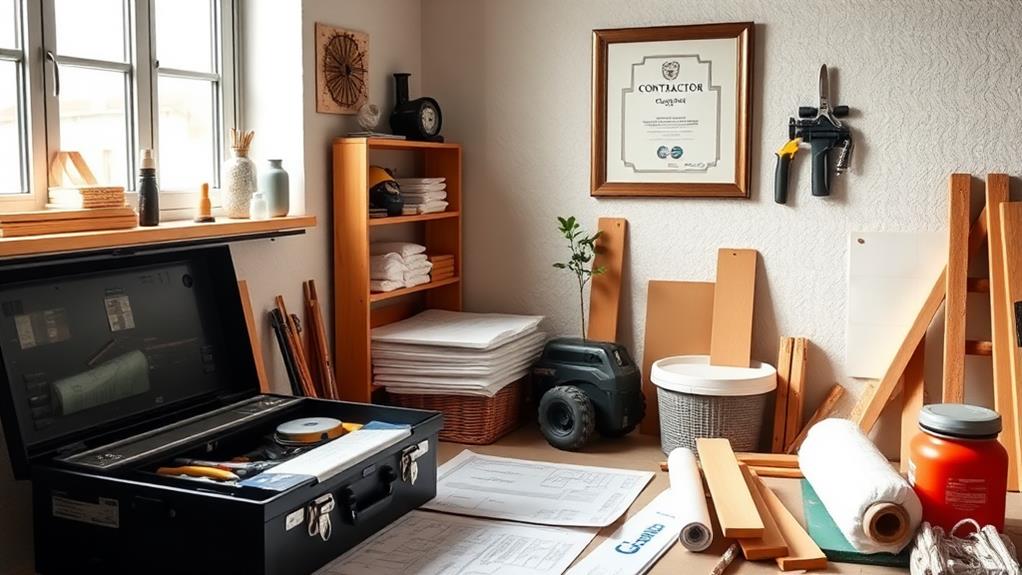When you're hiring licensed contractors in Los Angeles, focus on key factors like licensing, insurance, and experience. Verify the contractor's license through the Contractors State License Board to confirm compliance with California regulations. It's important they have both general liability and workers' compensation insurance to protect you from financial risks. Assess their experience by reviewing past projects and asking for references. Clearly communicate your project expectations and inquire about timelines and payment terms to avoid misunderstandings. Getting multiple bids helps you compare pricing and scope effectively. By keeping these factors in mind, you'll be better equipped to make an informed choice. More insights await you on this subject.
Importance of Hiring Licensed Contractors

When it comes to home improvement or construction projects, hiring licensed contractors is essential. In California, these professionals are required to adhere to strict regulations, minimizing financial risks associated with unlicensed operators. If your project is valued at $500 or more, you must comply with state laws, making it vital to work with licensed contractors.
They're mandated by California law to post a $12,500 bond with the Contractors State License Board (CSLB), which provides a financial safety net in case issues arise with their work.
Additionally, licensed contractors often deliver quality workmanship. They meet specific training and industry standards, ensuring you receive the best possible results. You can easily verify a contractor's license by reaching out to the CSLB at (800) 321-2752, helping you engage with qualified professionals.
Moreover, hiring licensed contractors protects you and your property. They typically carry workers' compensation insurance, which reduces your liability in the event of worker injuries on-site.
How to Find Licensed Contractors
Finding licensed contractors for your home improvement projects doesn't have to be overwhelming. Start by visiting the California Contractors State License Board (CSLB) website or calling (800) 321-2752 to verify the contractor's license status.
It's essential to confirm that their license covers the specific type of work you need.
Next, seek referrals from trusted friends, family, or neighbors who've had positive experiences with licensed contractors for similar projects. Their insights can be invaluable.
Additionally, utilize professional associations and local licensing authorities, which often provide directories of reputable contractors in your area.
Consider using services like GreatBuildz, which connects homeowners with vetted contractors and offers free consultations for project planning. This can simplify your search and help you find suitable candidates.
Don't forget to read online reviews and ratings to assess the contractor's quality. Pay attention to any red flags or common complaints from previous clients, as these can indicate potential issues.
Evaluating Contractor Experience and Credentials

Evaluating a contractor's experience and credentials is essential for guaranteeing your project runs smoothly and meets your expectations.
Here are three key aspects to focus on:
- Verify the Contractor's License: Check the California Contractors State License Board (CSLB) to confirm that the contractor's license is active and appropriate for your project. Remember, California law mandates licensing for projects valued at $500 or more.
- Insurance Coverage: Ascertain the contractor has relevant insurance, including general liability and workers' compensation. This protects you in case of accidents or damages during the project.
- References and Experience: Request references and examine completed projects to assess the contractor's work quality.
Look for licensed contractors with a B-license, as this allows them to manage multiple trades, ensuring they've the experience needed for your specific project.
Key Questions to Ask Contractors
When you're hiring a contractor, it's crucial to ask the right questions to guarantee a successful project.
Start by verifying their licensing and insurance, which protects you and your investment.
Additionally, clarify the project timeline and payment terms to avoid any surprises down the road.
Project Timeline Expectations
Understanding project timeline expectations is vital for a successful renovation or construction experience. When hiring licensed contractors, you need to guarantee that both you and the contractor are on the same page about the timeline.
Here are three key questions to ask:
- What's your estimated completion time? Get a detailed estimate regarding how long the project will take, including potential delays.
- What's your experience with similar projects? Understanding their past experience helps gauge how accurately they can predict timelines based on previous work.
- What's your scheduling process? Inquire about how they plan to manage subcontractors and materials to stay on track.
Moreover, make certain to discuss contingency plans for unexpected issues and how these may impact the timeline.
It's also important to clarify their approach to communication regarding progress updates. Regular updates can help you feel at ease and allow for any necessary adjustments to the schedule.
Licensing and Insurance Verification
Before hiring a contractor, it's crucial to verify their licensing and insurance to protect yourself from potential risks. Start by checking their contractors license status through the California Contractors State License Board (CSLB). You can do this by calling (800) 321-2752 or visiting their website. Make sure the license is active and covers the type of work you need.
Next, confirm that the contractor has the necessary insurance, including general liability and workers' compensation. This insurance is legally required if they've employees and will shield you from financial liabilities in case of accidents or damages.
Don't forget to ask for proof of bond. Licensed contractors must post a $12,500 bond with the CSLB, which acts as a safety net for filing claims if problems arise with their work.
Inquire about the contractor's experience with projects similar to yours to make certain they're well-versed in your specific project scope.
Budget and Payment Terms
After you've verified a contractor's licensing and insurance, it's time to discuss budget and payment terms. This step is essential to guarantee you're on the same page and avoid any surprises down the line.
Here are three key questions to ask:
- Can you provide a detailed breakdown of costs, including labor, materials, and any additional fees?
- What's the payment schedule? Reputable practices suggest that down payments shouldn't exceed $1,000 or 10% of the total project cost, whichever is less.
- Do you require progress payments based on completed work?
Understanding Contractor Licensing Requirements

Maneuvering contractor licensing requirements is vital for anyone looking to hire a contractor in Los Angeles. In California, contractors must hold a valid license from the Contractors State License Board (CSLB) for projects valued at $500 or more. This regulation guarantees compliance with state laws and protects your investment.
There are 44 different license classifications, including general contractors and various specialty contractors, each necessitating specific skills and qualifications.
Before hiring, it's important to verify a contractor's license status through the CSLB website or by calling (800) 321-2752. This step confirms that the contractor is active and compliant with state regulations.
Licensed contractors must also post a $12,500 bond with the CSLB, providing financial security against substandard work.
Moreover, hiring licensed professionals guarantees they carry necessary insurance protections, such as workers' compensation. Unlicensed contractors may lack these protections, exposing you to significant financial risks if accidents occur on the job site.
Comparing Contractor Bids Effectively
When you're comparing contractor bids, it's essential to focus on the scope of work and guarantee pricing transparency.
Getting at least three estimates helps you see a range of services and costs, allowing you to identify any gaps in lower bids that might lead to unexpected expenses later on.
Clear communication of your project requirements will also enhance the accuracy of these bids, making it easier to find the right contractor for your needs.
Scope of Work
Understanding the scope of work is vital for effectively comparing contractor bids. A detailed scope guarantees that you know exactly what to expect from your licensed contractors, which can greatly reduce the risk of misunderstandings.
When reviewing bids, keep these three things in mind:
- Detailed Task List: Each bid should clearly outline all tasks to be performed, including specific materials and methods. This is fundamental to avoid any surprises later on.
- Timeline for Completion: Confirm that the proposed timelines align with your project expectations and deadlines. A well-defined timeline aids in tracking progress and managing expectations throughout the project.
- Clarification of Terms: Look for any ambiguous terms or exclusions that could lead to misunderstandings later. It's important to clarify any vague language to guarantee all parties are on the same page.
Request at least three contractor bids to grasp pricing differences and identify inconsistencies in the proposed scopes of work.
Pay close attention to what's included in each estimate, as lower bids may skip essential elements, resulting in hidden costs.
Utilizing the California Contractors State License Board (CSLB) can help you verify each contractor's licensing status and confirm they're qualified for the job at hand.
By focusing on the scope of work, you can make informed decisions that align with your project goals, ensuring a smoother construction process and a successful outcome.
For more information on licensed contractors in LA, you can refer to expert resources that provide valuable insights into the hiring process.
Pricing Transparency
After establishing a clear scope of work, the next step is guaranteeing pricing transparency when comparing contractor bids. Start by requesting at least three bids from different licensed general contractors. This'll help you establish a baseline for pricing and services, allowing you to spot any outliers that might indicate inflated costs.
Each bid should include a detailed scope of work and a list of materials, which are vital for evaluating the overall value of each proposal. Be cautious of bids that seem considerably lower than others. These may exclude essential items, leading to unexpected costs down the line.
Clear communication of your project requirements enhances bid accuracy, confirming that all contractors are on the same page. When reviewing bids, focus on the total cost and the payment schedule.
Make sure down payments comply with California guidelines, which state they shouldn't exceed $1,000 or 10% of the total cost—whichever is less. By prioritizing pricing transparency, you'll not only guarantee fair and accurate bids but also set a solid foundation for a successful project with your chosen contractor.
Payment Guidelines for Contractors

Guiding payment guidelines for contractors can save you from potential pitfalls and guarantee a smooth project experience. Here are three key points to take into account:
- Schedule Payments: Link payments to completed work stages. This way, you won't overpay before the job is finished, and you can verify the quality at each step.
- Minimize Down Payments: Keep down payments low—ideally under $1,000 or 10% of the total project cost. This reduces your financial risk considerably.
- Use Traceable Payment Methods: Avoid cash payments. Instead, opt for checks, money orders, or credit cards to maintain clear records of all transactions.
Always maintain thorough records of every payment made to the contractor. This practice is essential if disputes arise later in the project.
Make certain the final payment is only released after you've inspected the work and signed a Completion Certificate.
When selecting contractors near you, don't forget to check their license number.
Handling Contracts and Agreements
A solid contract is your best defense against misunderstandings and disputes when hiring a contractor. It's crucial to review the contract carefully, ensuring it clearly specifies the job details, total cost, and completion timeline. This transparency helps you avoid conflicts down the line.
A detailed list of building materials to be used should also be included, as it defines the project's scope and protects your interests.
Before signing, read the contract thoroughly. If any terms are unclear or incomplete, don't hesitate to ask questions or request revisions. Protect yourself by ensuring the contract includes proof of workers' compensation insurance from the contractor. This requirement not only complies with California law but also shields you from potential liabilities.
Moreover, be mindful of down payment limits. The initial payment shouldn't exceed $1,000 or 10% of the total project cost, whichever is less. This practice mitigates financial risk and keeps the contractor focused on completing your project as agreed.
Resolving Issues With Contractors

What should you do if issues arise with your contractor's work?
It's crucial to act quickly and know your options. Here are three steps to help you navigate the situation:
1. Document Everything: Keep thorough records of all communications and agreements with your contractor.
This documentation is important for supporting any claims or disputes.
2. Understand Your Consumer Rights: Familiarize yourself with your rights as a homeowner.
You can cancel a contract within three business days by sending written notice via certified mail.
This provides you with a safety net should you feel dissatisfied.
3. File a Complaint: If the issues aren't resolved, consider filing a complaint with the California Contractors State License Board (CSLB) by calling (800) 321-2752 or using their online complaint form.
They can help address your concerns and hold contractors accountable.
Conclusion
In summary, choosing licensed contractors in LA can save you from potential headaches down the line. By following the guidelines outlined, you'll guarantee you're not just throwing caution to the wind. Take your time to evaluate their experience, ask the right questions, and compare bids carefully. With a little due diligence, you can find a reliable contractor who meets your needs and helps your project go off without a hitch. Remember, a job well done starts with the right choice.
